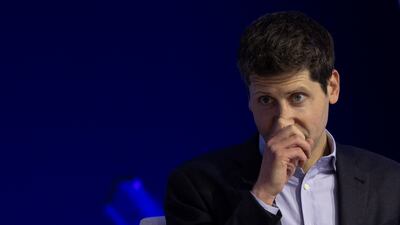After its meteoric rise owing to kick-starting the rapid growth of generative artificial intelligence, OpenAI has found itself at the centre of corporate drama.
Suddenly gone is Sam Altman, who was chief executive of the Microsoft-backed company and led the sensational rise of ChatGPT.
His departure raises questions about what's happening at one of the world's most influential technology organisations, and its trajectory.
Why was Sam Altman ousted?
Mr Altman's removal came as a surprise, especially considering the momentum he has built – becoming not only the face of the California-based company, but of the AI industry's boom.
He had also become the go-to voice for the industry, with his views on AI development and regulation seen as a guide to the future of the beneficial yet polarising industry.
OpenAI was a bit vague with its reasons for removing Mr Altman, primarily pointing to his lack of candour. Its statement, posted on its website late on Friday, was unflattering to say the least.
“Mr Altman’s departure follows a deliberative review process by the board, which concluded that he was not consistently candid in his communications with the board, hindering its ability to exercise its responsibilities,” it said.
And then there was the parting shot: “The board no longer has confidence in his ability to continue leading OpenAI.”
His dismissal was also reportedly because of arguments within OpenAI that the company wasn't developing its AI products safely enough. OpenAI has yet to respond to any media queries regarding the situation.
After Mr Altman's firing, the company held an all-hands meeting, in which some employees said OpenAI chief scientist Ilya Sutskever may have felt Mr Altman was “moving too quickly to commercialise software at the expense of potential safety concerns”, The Information reported.
Mr Sutskever, crucially, was the person who informed Mr Altman of his ousting, after the latter was invited to a video meeting on Friday.
Mr Altman has only reacted on X, formerly known as Twitter, saying that he “loved my time” at OpenAI, while leaving a cryptic message.
“Today was a weird experience in many ways. But one unexpected one is that it has been sorta like reading your own eulogy while you’re still alive,” he said.
OpenAI has appointed chief technology officer Mira Murati as its interim chief executive as the company searches for a permanent successor to Mr Altman.
Has this caused any ripple effect within OpenAI?
Yes – and, as of Saturday, it seems to be growing.
Following Mr Altman's dismissal, OpenAI said that Greg Brockman was stepping down as its chairman, but would remain as president and directly report to the board.
However, Mr Brockman decided to leave the company altogether and shortly thereafter posted on X that, “based on today's news, I quit”.
OpenAI’s board of directors comprises Quora chief executive Adam D’Angelo, technology entrepreneur Tasha McCauley, the Georgetown Centre for Security and Emerging Technology’s Helen Toner and Mr Sutskever.
And on Saturday, The Information reported that three senior researchers – research director Jakub Pachocki, AI risks evaluator Aleksander Madry and researcher Szymon Sidorhave – also quit.
Their departures are a “sign of immense disappointment among some employees” after Mr Altman was booted out, it said.
OpenAI has not confirmed any of these departures.
After Mr Altman's firing, there seemed to have been unrest within the company:
How has Microsoft reacted?
Microsoft, OpenAI's biggest backer that had pledged a reported $10 billion to boost the company, said it remained committed to the company.
However, the Windows developer was blindsided by Mr Altman's departure, having been informed only about, 10 minutes before OpenAI broke the news, persons familiar with the situation said.
Shortly after OpenAI's announcement, Microsoft released a brief statement from its chairman and chief executive Satya Nadella, who delivered a vote of confidence in OpenAI amid its leadership change – without any mention of Mr Altman.
“We have a long-term agreement with OpenAI with full access to everything we need to deliver on our innovation agenda and an exciting product road map; and remain committed to our partnership, and to Mira and the team,” the statement read.
“Together, we will continue to deliver the meaningful benefits of this technology to the world.”
What could be next for OpenAI?
While indeed there are questions being raised on how OpenAI's strategy will move forward with Mr Altman gone, analysts say that the sudden decision isn't likely to affect its business.
“This seems to be a case of an executive transition that was about issues with the individual in question, and not with the underlying technology or business,” said Rowan Curran, an analyst at Forrester Research.
And while Mr Altman's exit was “shocking”, OpenAI still boasts a “deep bench” capable of driving the business forward, said Arun Chandrasekaran, an analyst at Gartner, who was “sure” that the company had taken the decision “after a lot of deliberation”.
“OpenAI does have a deep bench of technical leaders and it will be interesting to see how its next generation of leaders steer by continuing its fast paced innovation culture, scaling the business and meeting the expectations of regulators and society at large.”


